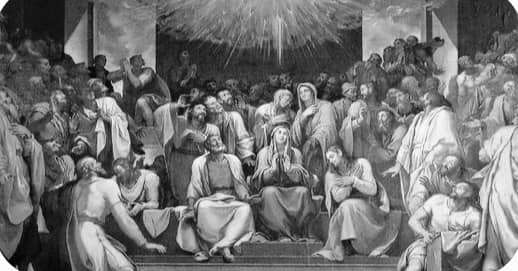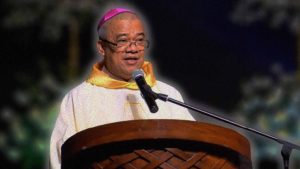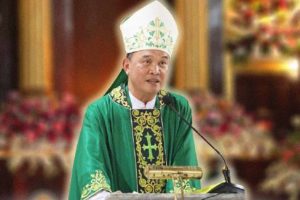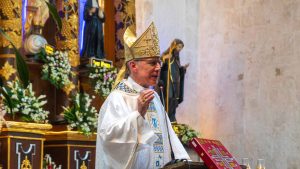4,465 total views

The celebration of Pentecost Sunday is associated with the giving of the Holy Spirit by Jesus to the apostles on the evening of his resurrection (John 20:19-23). The Pentecost is one of the three great annual festivals which the Jews are obliged to observe as prescribed in Ex 23:14-17, (cf also 34:18-34; 2 Chr 8:13; cf s1S#32 Pentecost, 5/23/21).
In the Bible, the Spirit,(cf s1S#13, 1/10/21), “rûach” in the OT is, “the agent of creation with that awesome power (Gen 1.2; Ps 33:6; Ez 37:1-10); second, as a source of inspiration and power that moved the leaders of Israel- Moses to Joshua, Judges, Kings, Prophets and the “Servant of The Lord” (Is 42), as vehicles of God’s revelation and activity; and third, as God’s presence in the covenantal community (Ez 11; 36). Continuing the OT motifs about the “rûach”, the word “pneuma” (πνευμα) in NT refers explicitly to the Spirit of God and specifically to the Holy Spirit: first, as the agent of conception in the birth of Christ (Mt 1:18ff; Lk 1:35ff) and the new birth or regeneration of Christians (John 3:5ff; 6:63); second, the Spirit is the source of divine revelation (2 Pt 1:21) and one can consider also the revelatory presence of the Holy Spirit in Jesus’ baptism: Mk1:9ff, Mt 3:13ff; Lk 4:21ff, noting as well its ‘hovering’ action reminiscent of creation and confirming Jesus as the “Servant of the Lord” (Is 42; Ps 2); third, the Holy Spirit is given to the new covenant people of God (cf Joel 2:28; John 20:23; Acts 1:8) empowers the Church for its mission (Acts 2), dwells in them (Lk 1:15, 67, 1 Cor 6:19ff), illuminating and guiding them, as seal of salvation and sanctification (Rom 15:16, 1 Cor 2:10, Eph 1:13)”.
In the gospel of John in particular, the Holy Spirit “is the second advocate, (cf s1S#137, Another Advocate, 5/13/23), Jesus being the first: ‘If anyone does sin, we have Advocate with the Father, Jesus Christ the righteous one’, (1 Jn 2:1, cf s1S #86 Advocate, 5/22/22). It performs several roles one of which has the sense of a legal or forensic work of a counselor who comes as a prosecutor to convict the world immersed in untruth and perversity, (16:8-11). Thus it is the witness in defense of Jesus and a spokesman for him in the context of his trial by his enemies. A consoler of the disciples, it takes Jesus’ place among them and dwells within them (v17); and as the Spirit of truth, it continues Jesus’ teaching ministry and guides the disciples and thus their helper (15:26) . In other words the Holy Spirit’s mission is one of revealing the truth, convicting of sin, and applying the context of Jesus’ teaching to the lives of his disciples to enable them to maintain a vital relationship with God through his indwelling presence…”
We all receive the gift of Jesus, the Holy Spirit. It means, as our advocate, we have someone who represents our interests, and our defense, and one who fights for us. And with Jesus, we have not one but two advocates who accompany us on our journey. We only have to observe the commandment of love so that the Father, the Son, and the Spirit may remain in us (vv15, 21; 1 Jn 2:5). Amen.
s1S#32 Pentecost
“….The three great annual festivals which the Jews are obliged to observe as prescribed in Ex 23:14-17, (cf also 34:18-34; 2 Chr 8:13). The second of these, coming between the Feast of Passover/Unleavened Bread and the Feast of the Tabernacles/Booths, is called the Feast of Weeks/Harvest and eventually referred to as Pentecost as well, because it occurs 7 weeks after the beginning of the grain harvest, or 50th day after the Sabbath of the Passover week, (cf Dt 16:9-16; Lev 23:15-16)….the word Pentecost, the transliteration of ‘pentēkostē’ literally means ‘fiftieth’… From its original agricultural context, it began to be associated with the religious history of the Hebrew people, which the book of “Jubilees” identifies with the covenant between God and Noah, (Jub 6:1-21, cf Gen 8:20-22, 9:8-17). And probably only after the destruction of the Temple in A.D. 70 that Pentecost was finally transformed into an observance of the giving of Torah on Mt. Sinai, alluding to the time interval between Passover and the arrival at Sinai (cf Ex 19:1).
In the book of Acts (2:1-42), the description of the first Pentecost after the death and resurrection of Jesus (is) where one could get the Christian meaning of the event, associated with the outpouring of the Holy Spirit as Jesus has promised, (Acts 1:8). Aside from the fulfillment of the promise of the Lord, the event is interpreted by Peter as fulfillment as well of the prophecy of Joel 2:8-3:2, when each one would receive the Spirit of the Lord, (cf. also Nm 11:29) and of Ezekiel 36: 24-28 when God would cleanse his people, change their hearts of stone to hearts of flesh and fill them with Spirit. This event could also be an allusion to the Tower of Babel where the diversity of tongues is once again united into one by the Holy Spirit, (Gen 11:1-9).
The Pentecost, then, means that just as the produce of the earth is the generous gift of God, so is the Spirit, his supreme gift, the outpouring of which is the harvest of all the works of God, the greatest of which was the resurrection of Jesus. And just as it is the celebration of the Old Covenant and giving of the Law on Mt. Sinai, so the gift of the Spirit is the fulfillment of the gift of Law and recognition of the New Covenant written by the Spirit on the hearts of the disciples. With that gift the Church is now empowered to address herself to all nations and to be understood by them, fulfilling the mission which was commanded to her by Jesus….”
s1S #86 Advocate
“The noun ‘paraklētos’ (παράκλητος) is a rare word derived from its verbal form parakleō. Its precise translation is difficult to determine but understood to have the underlying sense of comfort, encouragement, and exhortation. If rendered it may be taken to mean “one called (‘kletos’) alongside (‘para’) to help, offer comfort, etc. It is given in the face of persecution, catastrophe, or suffering (Mt 2:18, 5:4; 2Cor 1:4f; Lk 16:25 Acts 20:12); or given to a penitent sinner (2Cor 2:7).
When referred mainly to the person of the Holy Spirit, particularly in the gospel of St. John, it includes the legal or forensic connotation of “advocate or counselor” (John 14:16,26; 15:26; 16:7). Thus the Paraclete is a witness in defense of Jesus and a spokesman for him in the context of his trial by his enemies; the Paraclete is a consoler of the disciples for he takes Jesus’ place among them; the Paraclete is a teacher and guide of the disciples and thus their helper. In other words, the Holy Spirit’s mission is one of revealing truth, convicting of sin, and applying the context of Jesus’ teaching to the lives of his disciples to enable them to maintain a vital relationship with God through his indwelling presence. It is the same Spirit who takes the lead in guiding and directing the church (Acts 15:1-29; v28), and continually renewing it until it becomes the holy city, the new Jerusalem shining brightly because of the divine indwelling (Rev 21: 10-14, 22-23)”.








